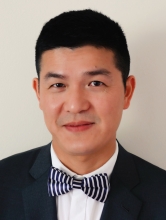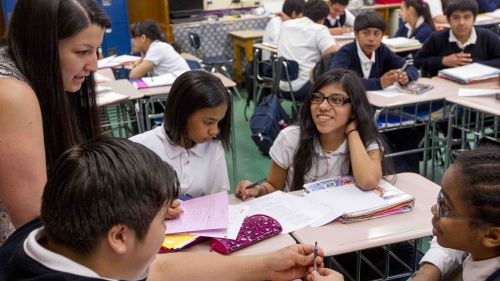
Steinhardt Assistant Professor Kongji Qin’s article, titled "Curriculum as a Discursive and Performative Space for Subjectivity and Learning: Understanding Immigrant Adolescents' Language Use in Classroom Discourse," recently won a publication award from The Modern Language Journal (MLJ).
Dr. Qin’s article received the “Best of MLJ for 2020” award, recognized by the Journal’s Editorial Board Article Award Committee as being of the highest quality with the broadest potential impact on the field of second-language learning and teaching.
We spoke with Dr. Qin, an assistant professor of TESOL, bilingual, and foreign language education in the Department of Teaching and Learning, to learn more about his paper that earned a nod from one of the world’s most prestigious journals in applied linguistics.
How did your research in this area begin?
Dr. Qin: “This data analyzed in this work was from my dissertation study, which I completed a few years ago. My goal in this critical ethnographic study was to understand how immigrant youths from different cultural and linguistic backgrounds approach the study of the English language and how their language learning is connected to their identity negotiation.
This ethnography was conducted in one Midwestern high school in the United States. I immersed myself in the high school, particularly the ESL classroom, several times a week for almost two years, observing three male, ninth-grade students from Taiwan, Malawi, and Libya. I observed how these students used the language practice in the classroom to perform their identities, particularly their gendered, racialized, and religious identity.
The paradigm of identity approach to second-language learning argues that language learning is also a socially situated activity that is deeply entangled with the learner’s identity and the unequal power relations in the educational and social contexts. This critical lens is particularly important during the COVID-19 pandemic as issues of identity and inequalities are heightened.”
What did your research find?
Dr. Qin: “In this article, I explore important aspects of the relationship between identity negotiation and language learning, such as how curriculum texts create identity categories for students, and how students perform their identity through engaging with the curriculum texts. I examine how immigrant youth use their language in the classroom to negotiate their identities in relation to curriculum, particularly during classroom sentence-starter practice. I take a discourse analysis perspective as it can help us identify hidden meanings in a text and examine social perceptions through language.
My analysis found that first, the sentence starters served two instructional goals:
- They were designed as scaffolding to assist students in practicing using the words, fulfilling an explicit linguistic goal of developing their vocabulary knowledge.
- Embedded in some sentence starters was an implicit goal of socializing the students to become ‘good learners.’ For instance, the teacher used a sentence starter “In order to maintain a good grade, a student should …” which invites students to articulate what a student should do in order to maintain good grades.
Second, I found the students often appropriated the sentence starters given by their teacher to negotiate subjectivity and power within and beyond the classroom. For example, when learning the word ‘assert,’ the teacher provided a sentence starter of ‘The student was taken to the principal’s office but asserted that he ...’ The Muslim student from Libya who I was observing completed the sentence as “The student asserted that he did not bring a bomb to school.”
His sentence referenced a then-recent news story about a Muslim middle school student who was arrested by police because teachers thought a clock he brought to school was a bomb. This student wanted to use the classroom arena to discuss Islamophobia in the news, an issue deeply connected to his identity negotiation, but his teacher would not engage, and instead only corrected his grammar. This example illustrates that students often appropriated curriculum texts to speak to issues of inequality that impacted their lives and identity.”
What do you see as the possible impact of this work?
Dr. Qin: “This work first makes an important contribution to curriculum theory in language education. This analysis is embedded in a larger argument about expanding our understanding of what constitutes ‘curriculum’ in the field of language education. I posit that ‘curriculum’ goes beyond the traditional understanding of what’s in the textbook, handouts, and assignments, to a bigger and more expansive notion to include what students are being exposed to during the teaching and learning process. In this case, it should include the identity categories created by and hidden in the curriculum texts, and identities performed by the students and the teacher.
Second, if we begin to redefine the idea of curriculum through this discursive lens, then we need to also begin thinking about what students do when they’re negotiating their understanding of what the teacher is teaching them. It is important for teachers to understand that language curriculum implicitly but powerfully shapes learners’ subjectivity or identity.
Teachers have a difficult and complex job, and we should help them develop professional knowledge and skills so that they can create an open space in their instruction to engage students to not only develop their language proficiency, but also their awareness of and relationship to concepts like social norms, equality, and justice.”



